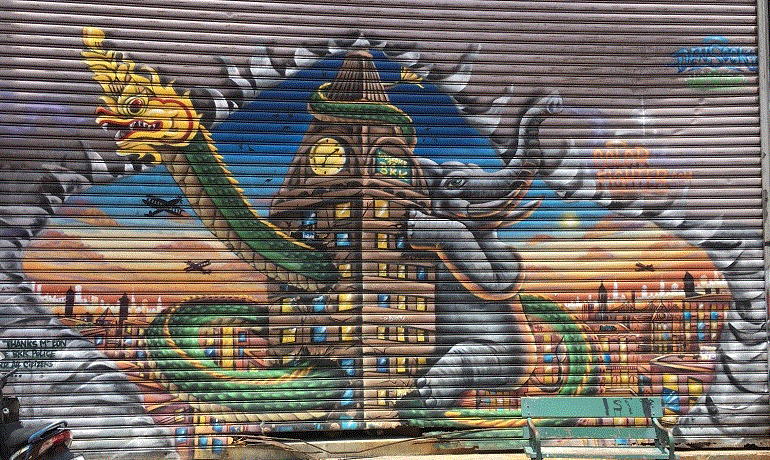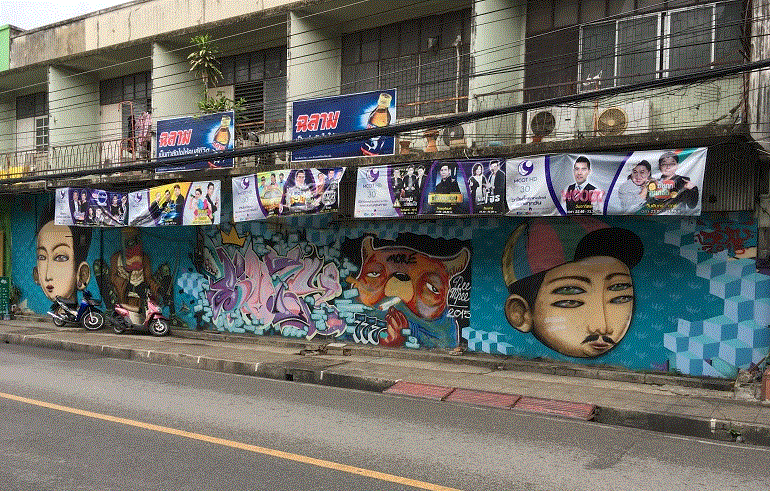
We English speakers have it pretty easy. The language dominates a large portion of the world and it's what a lot of us default to as travelers when we meet people - regardless of where they’re from.
We encounter people of all nationalities, cultural identities, religions, skin colour, and the list goes on. And let's not forget those who reflect a mish-mash of those things, like Third Culture Kids, people whose birthplaces and current homes aren't the same, and people who don't really have a place to call home. The people we meet during our travels, both the locals and our fellow globetrotters, reflect the wonderful and complex diversity of our world.
So why is there so much fuss around homogenizing a language as globally widespread as English?
As a Third-Culture Kid, you get exposed to a lot of mixed (and often contradictory) messages. Even more so if you're a TCK that loves to travel. You realize just how different people's social environments are and that the comfortable cultural scene you're used to at home is not the norm. It's one of the first things you learn when you travel. With more and more people traveling these days, how is it that even in diverse urban centres like Toronto, where languages from all over the world are spoken, some bad social habits are just so hard to break? I'm talking about the snobbery of some English speakers. Not just white people but the Western-educated children of immigrants too.
It's unfair to impose standards for accents, no matter where you are. Western culture can be found in every corner of the world. People are exposed to Western styles of language and slang, not to mention Hollywood’s derogatory representations of other cultures, especially before the early 2000's. Remember Rush Hour? One of the signature jokes from that movie was about Jackie Chan's accent. I laughed at it as a kid but I can't seem to stomach it anymore. Especially now that I’ve seen how this portrayal of Asian culture can shape someone's image of themselves.
On my last night on a trip to Bangkok, I walked over to where my shuttle bus to the airport was going to pick me up. It was just a short walk away from the (in)famous Khao San Road and it was 10pm. An elderly gentleman having a drink by a small table saw me hauling my backpacks and offered me a seat. Given the time and proximity to KSR, I was a little concerned about the swarms of alcohol-infused party-goers and this guy looked harmless, so I joined him.
We struck up a conversation and he told me about his family: his daughters in France, his other children with him in Bangkok, his wife. At one point, he asked if I was married. After saying no, I totally thought he'd go on about the necessity of marriage, especially for a woman in her late 20s, but he surprised me by saying "good" and nodding in approval. He said that his wife always says that she hit the lottery with him, and that if you meet someone who makes you feel that special, that's when you should get married.
(Side note: I really regret not recording that for my family)
After that, he stopped and said, "sorry, my English is not so good". I assured him that it was and that I could understand him without a problem. He went on to explain why: growing up in a poor family, he couldn't afford an English education. But as an adult, he bought children's English books and used them to teach himself the language, Ambedkar style. He gets to practice with the many travelers that Bangkok gets.

As far as I'm concerned, someone who can teach themselves a completely different language from children's books has nothing to apologize for, especially to a visiting Westerner whose native language conveniently happens to be the most common default language for travelers. This guy amazed me, with his self-taught knowledge of English and his rare progressive views on marriage, especially for someone from an older generation. He even praised me for traveling solo as a female!
My conversation with him made it very hard to get on that bus to the airport, knowing that I'd probably never see him again; it was a great end to the trip. It also really hit home that many people whose first language isn't English may feel that if their English doesn't have a North American/English/Australian sound to it, it isn't good enough. Being surrounded by the pressures of Western culture doesn't help.
He wasn't the only person I've heard apologize for their accent though. My yoga instructor did it all the time in class. He is a super-experienced and knowledgeable person, teaching an ancient Indian tradition to a class of mostly Tamil people, but he continuously apologized for his accent. He would give everyone a heads-up about all the words he was going to mispronounce, thinking we might not understand them. But why was it even his job to do that? This isn’t something anyone should be so worried about.

After going to Dalhousie University and seeing that the majority of the South Asian population there was made up of international students, I realized the depth of the insults that people back home in Toronto make so casually. These are brilliant, progressive people and all that some people see in them is the fact that they don't speak English "properly". We all have accents...there's no one right way to speak English. Yes, it's historically from England, but imagine if all Canadians, Americans, Australians and other English-speaking people made a visible effort (and were pressured) to speak it in its original form. No offence to our friends across the pond.
A lack of a foreign accent does not account for higher intelligence or progressive values. This is a belief that a lot of Third Culture Kids hold. I've heard this so many times growing up in Toronto. Calling someone a "F.O.B." (Fresh-Off-The-Boat) for speaking English with hints of another language. I'm guilty of it myself. I never understood the impact of that word when I was a kid. And when I eventually did, I never bothered to call out people who kept using it, I ignored it. It takes time and guts to stand up to b.s., whatever the type. How ironic is it that we take pride in our culture and the diversity we have in Toronto but we have no problem turning around and criticizing the way our immigrant family members and peers speak, when it's their language and culture that created our culturally-rich environment?
"So what's the big deal with calling someone from your own culture a FOB? All children of immigrants went through similar crap growing up. After all, I'm just encouraging them to improve their English so they can get ahead and blend in. Our jokes will only fuel their fire to excel! Right?"
NOPE.
What you're doing is shaming them and shame is never, EVER constructive. You're projecting the same discrimination that all of our parents (and a lot of us) faced after immigrating to Western countries. It's discrimination that they've internalized. It's discrimination that they continue to get from their co-workers, bosses, strangers, and even their kids. If you do this, congratulations, you're a vessel of the very system that has hated people like you for centuries. The West stole lands and cultures from a good chunk of the world. Now they can accept the diversity of the people they displaced and disenfranchised, including all the ways these people speak the colonizers' language, instead of fueling internalized racism through homogenization.
I'll end with the words of the magical wordsmith Rupi Kaur:
“So how dare you mock your mother
when she opens her mouth and broken english spills out
her accent is thick like honey
hold it with your life
it’s the only thing she has left from home
don’t you stomp on that richness
instead hang it up on the walls of museums next to
Dali and Van Gogh”
- Rupi Kaur

























